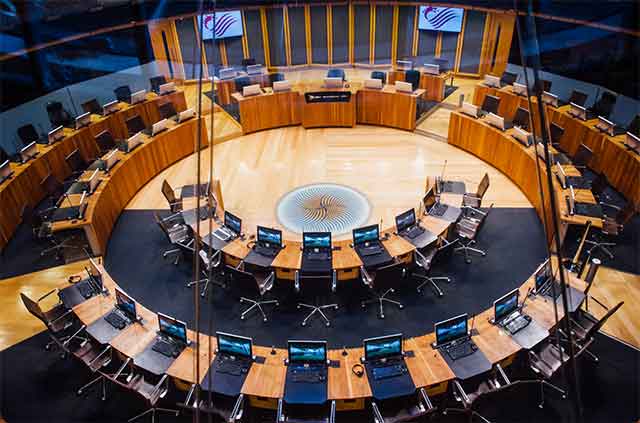Senedd members from across the political divide united to support a backbencher’s bid to make Wales the best place in the UK for British Sign Language users.
Mark Isherwood formally introduced his British Sign Language (BSL) bill in the Senedd on July 16, nearly seven years after calls were first made for legislation in Wales.
Mr Isherwood, a disability rights campaigner for decades, explained the bill would introduce legal requirements to promote and facilitate the use of BSL in Wales.
He warned: “Too often, deaf people are unable to access vital public services because they cannot communicate in their first language.
“This denies them their rights and places them at a significant disadvantage – whether in health care, education, employment, transport or otherwise.”
‘Falling behind’
Mr Isherwood said the bill will ensure policymakers and service providers consider the needs of deaf BSL signers, and the barriers they face, when designing and delivering services.
He told the Senedd: “BSL plays a crucial role in enabling communication and promoting inclusivity in everyday life – for many deaf individuals, BSL is their primary language.”
Mr Isherwood, a Conservative Senedd member who has represented North Wales for two decades, warned Wales risks falling behind the rest of the UK.
He told the chamber: “Scotland passed its BSL Act in 2015, the UK followed in 2022 for England and Northern Ireland is progressing its own bill. If we don’t act now, Wales will be the only UK nation without equivalent legislation.”
His bill would require Welsh ministers to publish, review and monitor a national BSL strategy. An adviser and panel would guide the development of local BSL plans which certain listed public bodies, including councils and health boards, would be required to publish.
‘Most progressive’
The north Walian warned: “Deaf BSL signers in Wales cannot access services in their first language and this is unacceptable. As one individual undergoing major surgery shared ‘throughout the whole time, I did not understand anything’.”
Mr Isherwood, who chairs Senedd cross-party groups on disability, deaf issues, autism, hospices and bereavement, said: “This bill not only ensures that the legislative framework for BSL in Wales keeps pace with developments elsewhere in the UK, it also goes further.”
He added: “If passed, therefore, this will be the most progressive BSL law in the UK.”
Jane Hutt welcomed and supported the bill on behalf of the Welsh Government, which recognised BSL as a language more than 20 years ago in 2004.
Wales’ social justice secretary, who has worked with Mr Isherwood on developing the proposed legislation, described the bill as a step towards lasting change.
The backbench bill would be the first passed by the Senedd in a decade, with bills on mental health, food, education, autism and older people’s rights rejected or withdrawn in that time.
‘Champion’
Concerns have been raised about the Senedd’s capacity for legislation brought forward by backbench members who are not a part of the Welsh Government. The BSL bill, as an example, was accompanied by a 113-page explanation and impact assessment.
If passed, it would be a first since Liberal Democrat Kirsty Williams introduced a bill on safe nurse staffing levels in 2014, which became law two years later.
Labour’s Jenny Rathbone chairs the Senedd’s equality committee, which she said had “cleared the decks” to focus on seeing the BSL bill become an Act by May 2026.
She told the Senedd: “I’m very much looking forward to the scrutiny of the bill and to ensuring that it does become law before the end of this parliament.”
Mabon ap Gwynfor, Plaid Cymru’s shadow health secretary, backed the BSL bill on behalf of his party, warning deaf people face extensive societal barriers from an early age in Wales.
Senedd members were full of praise for the hard work and commitment of Mr Isherwood – “a champion for deaf people for many years”.

